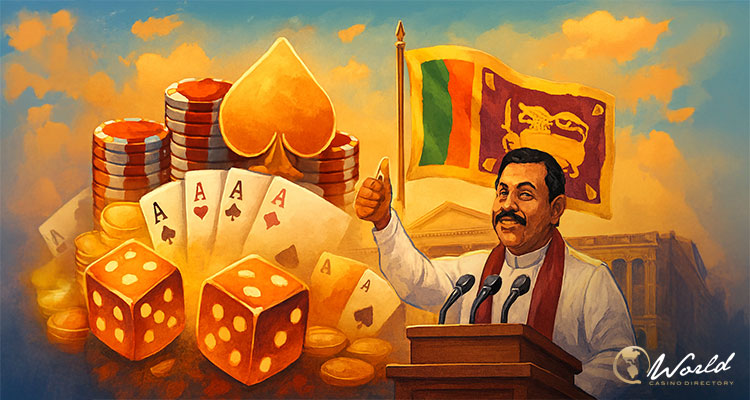Sri Lanka has introduced significant modifications to its betting and gaming regulations, marking a pivotal moment in the country’s fiscal and regulatory landscape. The Cabinet has approved the 2025 budget proposal that includes raising the betting and gaming levy from 15% to 18%, alongside a doubling of the casino entry fee for Sri Lankan citizens, which will increase from $50 to $100. This move comes after receiving clearance from the Attorney General, ensuring the amendments to the Betting and Gaming Levy Act can proceed smoothly.
The Cabinet’s approval has initiated the formal legal process, with the proposal set to be published in the Government Gazette before being sent to Parliament for approval. These changes are aimed at boosting the government’s tax revenues, which have become increasingly critical following the country’s ongoing fiscal challenges.
The Betting and Gaming Levy Act: A Critical Regulatory Framework
The Betting and Gaming Levy Act, a cornerstone in Sri Lanka’s gambling regulation, governs the taxation of gaming operations in the country. Under the Act, operators must pay an annual levy based on the gross revenue from their operations. The new increase to the gross collection levy—calculated as a percentage of the total turnover or receipts—will see the rate climb from 15% to 18%. Furthermore, the amendment also doubles the entry fee for Sri Lankans visiting casinos, marking a significant shift in how domestic patrons are treated under the law.
Minister Nalinda Jayatissa, speaking on behalf of the Cabinet, confirmed that the Attorney General had cleared the proposal for formal publication. “Clearance of the Attorney General too has been granted for the draft bill,” said Jayatissa, as reported by Economy Next. The bill will now be forwarded for parliamentary review after being officially published, setting the stage for the legal changes to take effect.
The changes come at a time when Sri Lanka’s casino and gaming sector is undergoing significant growth, particularly with the recent opening of City of Dreams Sri Lanka, the country’s first international-standard integrated resort. Managed by Melco Resorts and Entertainment, this new resort represents a key milestone in the nation’s strategy to position itself as a hub for international tourism, with a particular focus on attracting high-net-worth Indian visitors.
However, experts caution that the increased levies and entry fees may have unintended consequences. Dr. Dharshana Weerakoon, a Tourism & Hospitality Specialist, expressed concerns about the potential impact on local patronage. “The proposed increase in the gaming levy and the higher entry fee for locals will likely reshape the casino sector,” he explained. “While the government may benefit from added revenue, operators could face reduced domestic patronage and a stronger reliance on foreign visitors.”
On the social front, the higher fees for local casino entries are being positioned as a measure to encourage responsible gaming and reduce domestic gambling-related harm. The government has stated that these changes align with broader social responsibility objectives, aiming to curb addiction and promote healthier gambling practices among locals.
The Introduction of the Gambling Regulatory Authority (GRA)
The regulatory environment for gambling in Sri Lanka is also evolving with the establishment of the Gambling Regulatory Authority (GRA). Enacted as the Gambling Regulatory Authority Act, No. 17 of 2025, this new independent body is tasked with overseeing all aspects of the gambling sector, including casinos, horse racing, and offshore gaming operations.
Dr. Anil Jayantha Fernando, Deputy Economic Development Minister, explained that the GRA would provide much-needed oversight and transparency. “The regulator will ensure that casinos operate according to rules and concerns about money laundering are also addressed,” he stated. The GRA will be responsible for licensing operators, monitoring compliance, and ensuring the industry adheres to social responsibility standards.
Sri Lanka has been grappling with severe fiscal pressures in recent years, exacerbated by the 2022 economic crisis and the country’s default on foreign debt. In response, the government has sought to stabilize the economy through measures such as securing a $2.9 billion IMF bailout and implementing structural reforms. As part of these efforts, the IMF has urged Sri Lanka to increase its tax revenue from 7.3% of GDP to 15%, and the increased betting and gaming levies are seen as a critical step in achieving this goal.
President Anura Kumara Dissanayake emphasized the importance of these fiscal adjustments in supporting the country’s economic recovery. The gaming sector, which has seen growth in recent years, is viewed as a key potential revenue source. In 2020, Sri Lanka’s gambling industry was valued at $293.93 million, with projections indicating that it could grow to $410.04 million by 2026.


